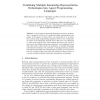Free Online Productivity Tools
i2Speak
i2Symbol
i2OCR
iTex2Img
iWeb2Print
iWeb2Shot
i2Type
iPdf2Split
iPdf2Merge
i2Bopomofo
i2Arabic
i2Style
i2Image
i2PDF
iLatex2Rtf
Sci2ools
118
click to vote
DALT
2008
Springer
2008
Springer
Combining Multiple Knowledge Representation Technologies into Agent Programming Languages
Abstract. In most agent programming languages in practice a programmer is committed to the use of a single knowledge representation technology. In this paper we argue this is not necessarily so. It is shown that rational agent programming languages allow for the combination of various such technologies. Specific issues that have to be addressed to realize such integration for rational agents that derive their choice of action from their beliefs and goals are discussed. Two techniques to deal with these issues which enable the integration of multiple knowledge representation techniques are presented: a meaning-preserving translation approach that maps one representation to another, and an approach based on so-called bridge rules which add additional inference power to a system combining multiple knowledge representation technologies.
Agent Programming Languages | DALT 2008 | Intelligent Agents | Knowledge Representation | Multiple Knowledge Representation |
Related Content
| Added | 19 Oct 2010 |
| Updated | 19 Oct 2010 |
| Type | Conference |
| Year | 2008 |
| Where | DALT |
| Authors | Mehdi Dastani, Koen V. Hindriks, Peter Novák, Nick A. M. Tinnemeier |
Comments (0)

